The MSM Melts Down Amidst America's Electoral Ineptitude
As the MSM Loses It Over Non-endorsements, the Election System Is Exposed
The Los Angeles Times declared on Wednesday, October 23rd, that it would not be issuing an endorsement for either candidate in the 2024 Presidential Election. This decision was widely unexpected, as it was pretty much assumed that the publication would be instructing its readers to vote for Kamala Harris. Later, on Friday, the 25th, the Washington Post, which is notoriously pro-establishment, made the same announcement, to the surprise of many and much to the dismay of upper-class liberals and a significant number of the Post's employees.
Top editors at both companies had drafts prepared and written to express their unflinching loyalty to the Democrat establishment’s latest empty suit, but in an unexpected twist, the families who own both of these publications made the surprisingly sensical choice to not explicitly choose sides in this election by telling people who to vote for.
To say that the liberal elites were perturbed by this act of journalistic integrity would be an extreme understatement.
First of all, I know it’s probably not a popular opinion considering the politically polarized atmosphere in the country at present, but this idea that large corporate news outlets—at least those who claim to be carrying out a principled journalistic function—are supposed to instruct their readers who to vote for is completely backwards. In modern America, we’ve come to mistake biased corporate punditry and blatant political activism for objective journalism. This is true for both sides.
Outwardly placing yourself in allegiance with a particular candidate is, at the very least, unjournalistic. One could go as far as to argue that it is actually the opposite of what Journalism is meant to be. The original purpose of the free press was to hold those in power to account, regardless of affiliation. Unfortunately, what passes for journalism today is essentially a form of cheerleading, one that has had a deleterious effect on the public’s ability to form even a remotely objective, nonpartisan view of reality.
That’s not to say that written political cheerleading and activism doesn’t have a place, it’s also a function that should and likely will always exist, but it should most certainly be differentiated from journalism. The institutions that once at least tried to maintain the image of objectivity have become the most blatant, outspoken Democrat activists in the entire country.
There’s a deeper philosophical argument to be had as to whether Journalism can ever be truly unbiased—that even if you try to remain completely removed from either side, you are still inserting your bias by choosing what to cover. The integrity comes from the journalist’s attempt to report as fairly and thoroughly as possible, considering various viewpoints and delivering facts without trying to convince anyone of something.
Now, even though this shamelessly partisan punditry is just the status quo in the corporate media space and is true for both sides, outside of Fox News, the entirety of big media is infested with the upper-class liberal elite, especially the Washington Post. You would have to go make many years to find an instance of the Post endorsing a Republican candidate … over two decades, in fact.
From their endorsement of John Kerry in 2004 to Joe Biden in 2020, WaPo typically instructs its readership to vote for the democrat establishment candidate of choice each and every election cycle.
But the times, they are a changing.
As I mentioned earlier, it was such a given that the Washington Post was going to endorse Kamala that the top editors had already drafted their endorsements preemptively. Needless to say, it came as a shock and was seemingly taken as some great affront when, by all reports, the multi-billionaire owner Jeff Bezos presumably came to the unexpectedly principled decision that the paper should not be in the business of issuing endorsements; not just this cycle, but for all elections going into the future.
Here, from the Post itself, is an opinion column from the leadership of the publication—meaning the publisher who runs the paper for Bezos—explaining the reason for this shift in policy.
The Washington Post will not be making an endorsement of a presidential candidate in this election. Nor in any future presidential election. We are returning to our roots of not endorsing presidential candidates…
…We recognize that this will be read in a range of ways, including as a tacit endorsement of one candidate, or as a condemnation of another, or as an abdication of responsibility. That is inevitable. We don’t see it that way. We see it as consistent with the values The Post has always stood for and what we hope for in a leader: character and courage in service to the American ethic, veneration for the rule of law, and respect for human freedom in all its aspects. We also see it as a statement in support of our readers’ ability to make up their own minds on this, the most consequential of American decisions — whom to vote for as the next president.
The paper then recounts the glory days, when papers used to at least try to appear politically objective, recalling the elections of 1960 and 72’, in an attempt to shift the public perception of the outlet from essentially being the premier propaganda arm of the democrat party to being something more upstanding and moralistic.
Now, obviously there’s a glaringly disingenuous aspect to all of this. No one in their right mind who actually pays attention to political journalism believes that the Washington Post is hoping for anything besides Harris’ victory in November. There is virtually no pro-Trump representation at the post, with maybe the exception of maybe Marc Thiessen.
Interestingly, the Washington Post itself published a piece about what’s going on at the Washington Post.
An endorsement of Harris had been drafted by Post editorial page staffers but had yet to be published, according to two sources briefed on the sequence of events who spoke on the condition of anonymity because they were not authorized to speak publicly. The decision to no longer publish presidential endorsements was made by The Post’s owner, Amazon founder Jeff Bezos.
“This was a Washington Post decision to not endorse, and I would refer you to the publisher’s statement in full,” said Chief Communications Officer Kathy Baird
It would be a drastic understatement to say that pretty much every standard issue NPC among the liberal “elite”—IE boilerplate liberal operatives in the corporate media, in Government and in NGO world—had a collective psychobilly freakout when the news of the non-endorsements dropped.
Some of you may be familiar with the former Boston Globe and WaPo editor Marty Baron, who lead a Pulitzer-winning investigation into molestation cover-ups in the Catholic Church. Well, he saw the non-endorsement of Kamala Harris as dereliction of the Post’s duty to support the Democrat Establishment at every opportunity.
“This is cowardice, with democracy as its casualty,” Baron, also the former editor of the Boston Globe, wrote on X.
“@realdonaldtrump will see this as an invitation to further intimidate owner @jeffbezos (and others). Disturbing spinelessness at an institution famed for courage.” (The Boston Globe October 25, 2024)
What makes his condemnation particularly hypocritical is that Kamala Harris was complicit with the cover-up of multi-decade abuse allegations against the San Francisco Archdiocese.
He obviously wasn’t the only one who made a stink, from the online publication Semafor, we have a story about none other than Robert F-ing Kagan of all people (Neocon Co-founder w Bill Cristol of the Project for A New American Century, Husband of Victoria Nuland) resigning as editor from WaPo.
“The first prominent journalist, editor-at-large Robert Kagan, resigned Friday in response to the decision, Semafor first reported. But there may be more:
“People are shocked, furious, surprised,” said an editorial board member, citing internal discussions around resignation. “If you don’t have the balls to own a newspaper, don’t.”
The article goes on:
Members of the Post’s editorial board were taken aback on Friday when they learned about the decision from top opinion editor David Shipley. The board had drafted an endorsement of Harris earlier this month, which was sent to the paper’s owner Jeff Bezos. On Friday, NPR reported that opinion staff learned the news from at a tense meeting shortly before Lewis’ announcement.
One person familiar with the figures told Semafor that the decision already seemed to be impacting subscriptions. In the 24 hours ending Friday afternoon, about 2,000 subscribers canceled their subscriptions, an unusually high number, an employee said.
What does this say about readers of WaPo who would actually cancel their subscriptions once the Post exercises a modicum of journalistic integrity?
In most cases, reading a newspaper is meant to provide you with access to information so you can comprehend global events, not to operate as an advocacy organization for your political party or ideology.
Here we have Susan Rice, a current Biden White House staffer and former Obama national security adviser. She responded to the announcement as follows:
So much for ‘Democracy Dies in Darkness”. This is the most hypocritical, chicken shit move from a publication that is supposed to hold people to account.
And then, of course, we have the paragon of journalistic integrity Brian Stelter, who said:
“A member of the Wash Post editorial department tells me: Bezos's decision not to endorse is "an outrageous abdication of responsibility. Democracy doesn't die in darkness, it dies when people anticipatorily consent to a fascist's whims."
The story they’re attempting to construct is that Jeff Bezos is so terrified of the concentration camps Donald Trump is planning to construct that he forbade the Washington Post from endorsing Kamala Harris. It’s comical.
A litany of the usual suspects also voiced their disapproval.
In addition to their condemnations, some of these liberal “journalists” went so far as to push for a boycott of the Post.
This was the case with former editor-in chief of Salon, Joan Walsh:
The Los Angeles Times also refused to endorse either candidate, and naturally, that move was also depicted as a fear based response to a potential Donald Trump presidency. However, unlike WaPo, the L.A. Times owner, Dr. Patrick Soon-Shiong, actually does have a political reason to not endorse Kamala Harris, a reason that has so far been completely omitted by the bellyaching democrat celebrities and operatives on twitter.
There’s a reason they never mentioned this reason, because it conflicted with narrative.
Here’s how the New York Times reported:
In an interview with Columbia Journalism Review, Mariel Garza, who held the title editorials editor, said she had quit because “I want to make it clear that I am not OK with us being silent. In dangerous times, honest people need to stand up. This is how I’m standing up.”
Ms. Garza said that the editorial board had planned to endorse Ms. Harris, but that Dr. Patrick Soon-Shiong, the billionaire owner of The Los Angeles Times, decided this month that the newspaper would not make any endorsement for president. The paper did not explain to readers why it was not issuing an endorsement.
The paper itself may not have offered an explanation, but the owner’s daughter, a 32 year old woman who is very open about her politics, did. The Hollywood Reporter was able to deduce this reason; apparently, the Reporter has more traditional journalistic acumen than the Times.
In a thread of social media posts on Thursday, Nika Soon-Shiong attributed the decision to an opposition to Democratic candidate Kamala Harris’ position on the war on Gaza. She wrote that her father, a South African transplant surgeon, had worked as an emergency surgeon at Baragwanath Hospital in Soweto during apartheid.
“For my family, Apartheid is not a vague concept.” Maintaining that the decision to endorse was one made by the Los Angeles Times editorial board, Nika added, “This is not a vote for Donald Trump. This is a refusal to ENDORSE a candidate that is overseeing a war on children.”
So, it turns out that there was actually substantive reason for the non-endorsement, but the reason itself wasn’t very good for the prevailing liberal narrative.
I found all of this relevant because it’s a shameless, perfect example of everything that’s wrong with political “journalism” today.
Why Can’t the United States Tally its Votes in a Single Night?
It is maybe the most bizarre, yet accepted part of the modern American political tradition that for some reason, the United States stands almost completely alone in the “democratic world” in it’s inability to count all of its presidential votes in a single day. Many days pass, it can take weeks or even months for certain states to count every vote cast.
This is because the United States has not implemented a system that enables it to count all the votes, even though every other country in the democratic world can do that. In the 2020 Democratic primary in California, they didn't issue a final vote total until two and a half months after the day that voters went to cast their votes.
We are already being groomed to not anticipate any results or vote tallies being announced anytime close to election night.
Here’s Politico last week:
In an interview with POLITICO Magazine at the News Corp. building in Midtown Manhattan, Mishkin said that he plans on calling the election as soon as he can, but that a protracted vote count means it may take a few days.
The race seems very, very close. It is dependent on a number of states, like Pennsylvania, that we believe are going to be reporting in a pattern similar to the way they have reported in the past. So I’d say, the over/under is Saturday. Which was when the call was made last time. Which is when Pennsylvania is likely to come in.
And another one, this time from CBS News:
Unlike many other states, Pennsylvania can only begin processing mail-in ballots on the morning of Election Day.
It took four days to call the election in Pennsylvania in 2020. As those days passed, leaving the 2020 election results hanging in the balance, all eyes were on the Pennsylvania Convention Center in Philadelphia. Police and protesters were outside while Schmidt and his fellow members of the Board of Elections oversaw the counting of a record 375,000 mail-in ballots, most of them from Democratic voters.
[Schmidt] has urged people to be patient with Pennsylvania.
But there is great doubt that the inability to have a final count on Election day is anything but deliberate.
Independent journalist Glenn Greenwald offered an interesting take:
The country I know best after the United States or one of the countries I know best is Brazil, because of how closely I follow their politics and this is what happens in Brazil.
Brazil is, to put it mildly, not known for being particularly bureaucratically efficient. It's the anti-Germany, as I often think about it, it's a country that has a great deal of difficulty – and I find it a charm – for anything to work efficiently. Yet, the way elections work is that they take place on a Sunday, not Tuesday, to ensure that the maximum number of people can vote and that work doesn't interfere. Voting is mandatory.
So, there's a very pervasive culture that people do go and vote. They show an ID in order to vote even though Brazil has a well-known and notorious income inequality and it's not just people who are 18 and over, but even 16 to 18 who can vote. Brazil is a little bit smaller than the United States in population, but when you put all those things together of mandatory voting and a bigger voting bloc and having it be on Sunday, the number of votes ends up being roughly similar to how many votes have to be counted in the United States.
And the way every single election works is that the polls open at 8 in the morning and close at 5 in the afternoon or 6 p.m. in the afternoon, depending on the particular state. And then by 9 or 10 at night, 10:30 p.m. or 11 p.m. at the absolute latest, the full complete vote count not just for the presidential race but for the governor races, for the state legislatures are all fully counted and certified.
Some will say that it’s a population size issue, but if that’s truly the case, explain how Indonesia, a country with the largest voting population, is able to do it in a single day?
From U.S. News & World Report, back in February:
There are roughly 205 million registered voters, and turnout in past elections has been about 75%, according to the International Foundation for Electoral Systems, a U.S.-based organization that provides technical support for elections.
Voters have a six-hour window to cast their ballots. Indonesia has three time zones and the first polls, in the east, open at 2200 GMT on Feb. 13, and all will be closed by 0600 GMT on Feb. 14. Voting booths will be overseen by election officials, party members and independent observers to safeguard against manipulation. Polls must be closed nationwide before counting can begin.
Voters cast a secret ballot and dip fingers in indelible ink to prevent duplicate voting.
While an official vote count by the poll body is expected to last late into election night, quick counts by independent survey agencies should provide an early indication of results from 0800 GMT.
I could continue to list examples but I think you get the picture. If all of the other nations of the world can do it, then why can’t the U.S.?
There are some arguments that are worth noting. There's no federalized system in the U.S., the way there is in Brazil, France, Argentina, or South Korea. Instead, each state is responsible for counting and certifying its own vote totals. Most of these countries now use electronic voting, often with audited paper backups, whereas the United States continues to use very antiquated systems that prevent voting instantaneously or through a computer.
This is all by choice.
Still, we are chastised for even considering that their could be foul play in our elections. The truth is that you can and should ask why the United States makes the conscious choice to ensure that voting totals don't occur instantaneously, but over days and even weeks.
Can you blame Americans for being skeptical when days go by, the results keep changing and no one knows where ballots are, and there are ballots over here of one kind and ballots over here from another, and some are destroyed and some get lost and some get disputed. There’re so many angles for malfeasance that it’s little wonder Americans are losing faith in our electoral process, especially when what happens in the U.S., perhaps more than any other country, ripples out and has a dramatic effect on the entire world.
Until the United States chooses to fix this problem, there will be growing distrust in the electoral process.
Badlands Media articles and features represent the opinions of the contributing authors and do not necessarily represent the views of Badlands Media itself.
If you enjoyed this contribution to Badlands Media, please consider checking out more of Ryan’s work for free at the Post-Liberal.
Badlands Media will always put out our content for free, but you can support us by becoming a paid subscriber to this newsletter. Help our collective of citizen journalists take back the narrative from the MSM. We are the news now.




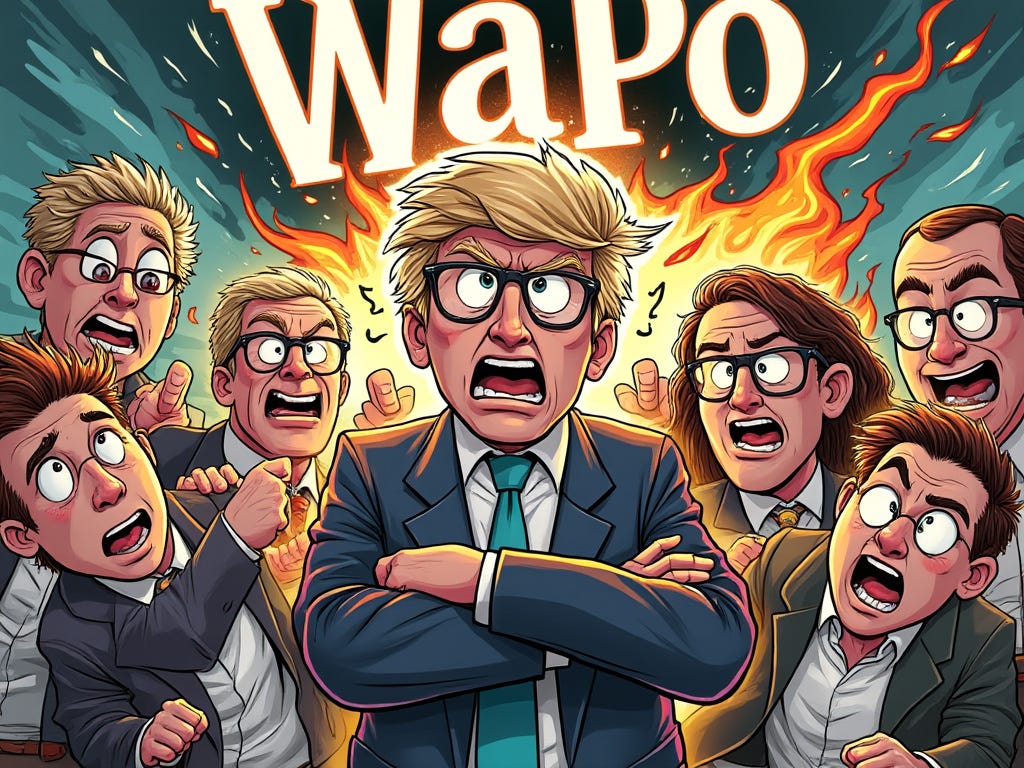
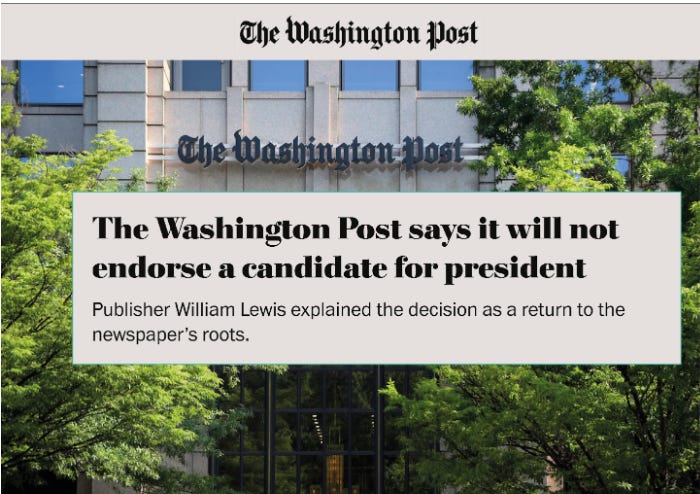
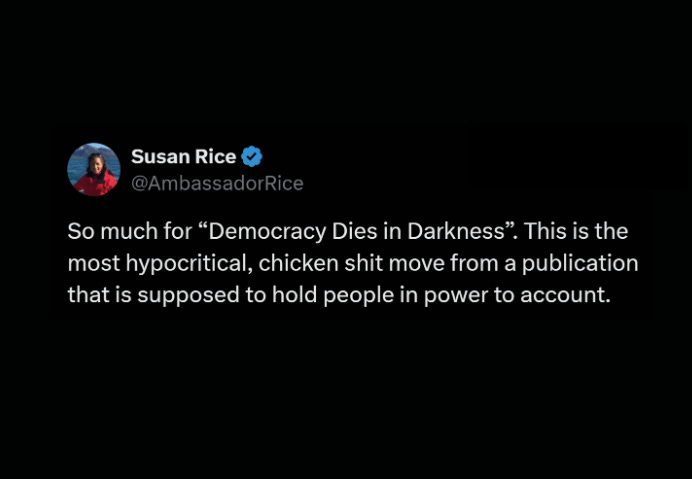
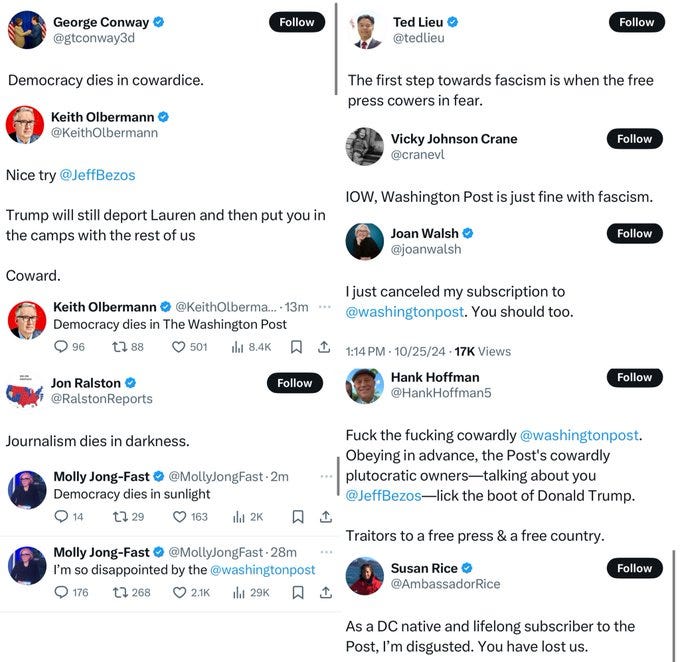
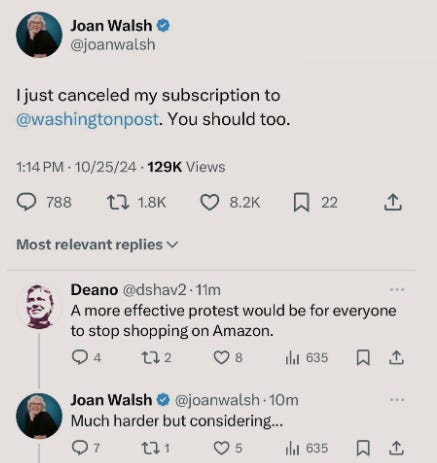
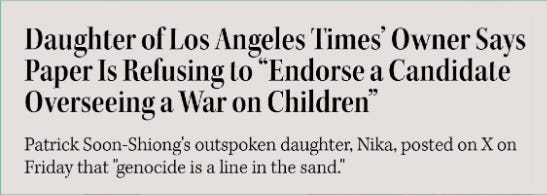
Let's hope more so-called "prominent journalists" resign. They are only propaganda pushers, and Constitutional Republic deniers.
Yes, indeed, everything you addressed today is all about choice. Not the choice of the people to:
- have propaganda outlets dictate who our vote it to be cast for
- the stupid inability to count votes in a single day
- the allowing non-eligible people to vote without IDs
- the coverup that the US is a constitutional republic, NOT a democracy
- Fox News is complicit, too…
- oh, and the election fraud that has kept these traitors in office for decades..
Thank you for the timely reminder, Ryan, and God bless you.🙏🇺🇸
-